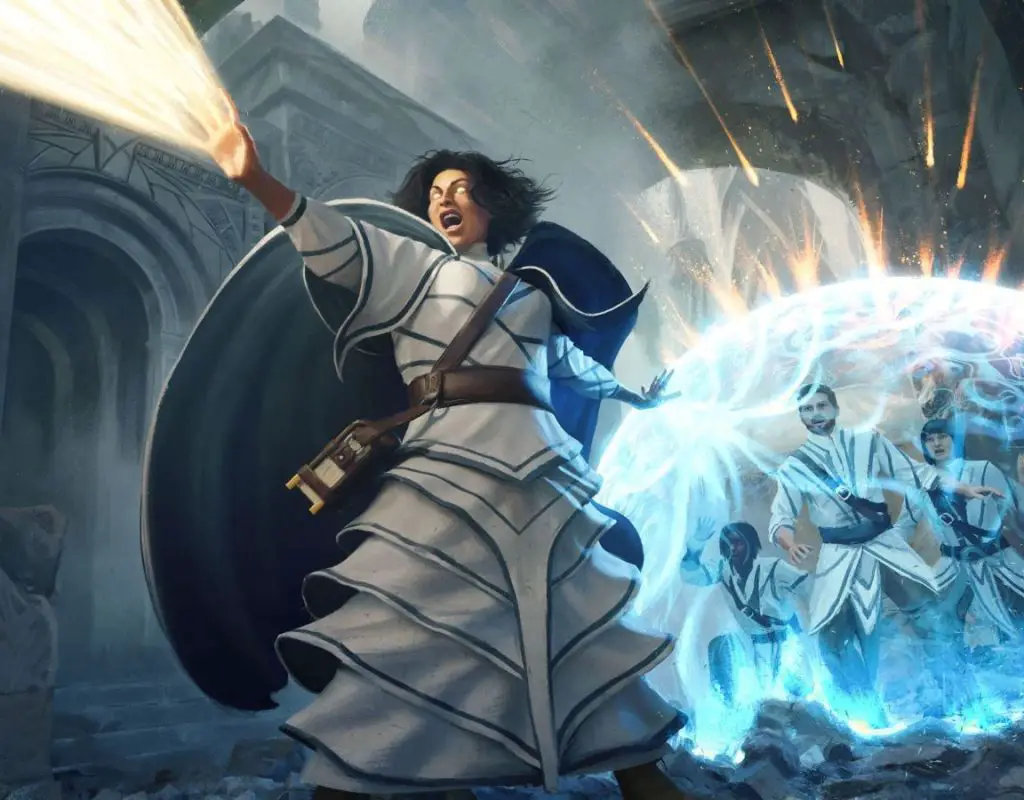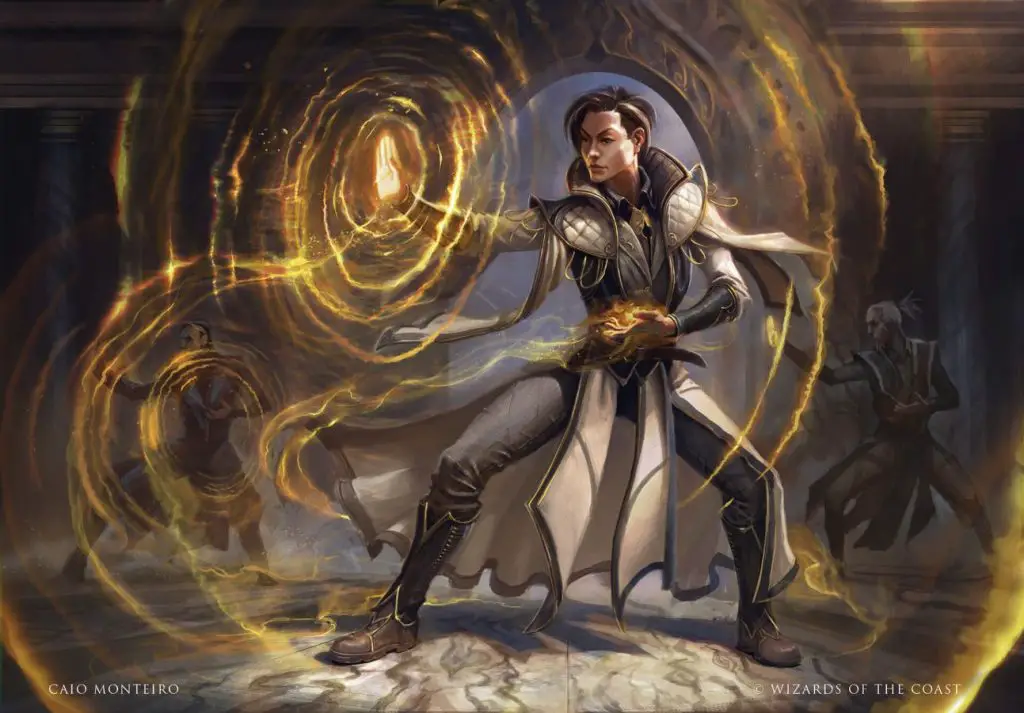Abjuration Wizards are proof that the best defense is not always necessarily a good offense. The best defense is often a great defense!
Using their arcane magic to better protect themselves and others, these Wizards pride themselves on their survivability.
After all, at some point, those enemies are going to start hitting back which can spell DANGER if you’re not careful!
So, if you wish to master the defensive art of arcane Abjuration, this article is for you.
This is the full guide to the Abjuration Wizard in D&D 5e!
What is the Abjuration Wizard in D&D 5e?
The school of Abjuration focuses primarily on defense, protection, and getting rid of magical effects.
Common uses for abjuration magic include:
- Negating another spell (either as it’s being cast or as an ongoing effect).
- Adding extra security to keep others out of places you don’t want them.
- Personal protection using magical force.
While any Wizard can learn abjuration magic, Abjuration Wizards specialize in it and can bring out even more interesting ways to use it.
This is especially evident with their ability to create an Arcane Ward that helps negate incoming damage. While it’s initially for personal use only, it can eventually also be used by the Abjuration Wizard to protect their allies!
Of course, other spellcasters regardless of their class or school tend to have a particular level of extra respect for Abjuration Wizards. If they don’t already, they will soon!
You can rest assured that if anyone is going to absolutely shut down an enemy spellcaster, it’s going to be the Abjuration Wizard!
To their allies, an Abjuration Wizard is a powerhouse of arcane protection. To enemies (and especially enemy spellcasters), these Wizards are some of the most irritating characters to possibly encounter.
The Abjuration Wizard is one of eight Wizard subclasses that appear in the 5e Player’s Handbook.
Role in the Party
Looking over the unique features you gain from this subclass, the Abjuration Wizard fits snugly in a defensive and utility role within the party.
That’s not to say that an Abjuration Wizard isn’t just as capable of blasting a group of enemies with a well-placed Fireball. Realistically, you’re going to want some good offensive spells prepared regardless.
These Wizards just tend to focus on their expertise in using arcane magic defensively!
In fact, Abjuration Wizards are great at offering extra protection from all kinds of threats. As we already covered, specializing in this school makes them uniquely qualified to absolutely shut down other spellcasters!
The name of the game for the Abjuration Wizard is timing. They’re experts at knowing when and how to defend against a threat for the greatest impact.
It can’t be stressed enough how much you shouldn’t underrate these Wizards!
As we’ll cover in the next section, the Abjuration Wizard gets some seriously cool features that help them better protect themselves and their allies.

Abjuration Wizard Features 5e
Abjuration Wizards have dedicated their lives to the study of arcane magic but specialize in the school of Abjuration.
Because they have such a deep understanding of this magic and its power, they’re capable of more powerful Abjuration magic than other Wizards.
This is reflected in the Abjuration Wizard’s class features.
Let’s dive in!
You Might Like: The Schools of Magic in D&D 5e Explained
Abjuration Savant (Level 2)
We kick things off with a feature that is shared by all of the Wizard subclasses in the PHB.
As a specialist in Abjuration magic, you’re more efficient when it comes to adding Abjuration spells to your spellbook.
The gold and time you must spend to copy a Abjuration spell into your spellbook is halved.
As a Wizard, your spellbook is your single most important possession. You will constantly be looking to learn new spells and add them to your precious spellbook.
Of course, this does take time, money, and a bit of luck when you’re looking for specific spells to copy into your book.
Thankfully, the time and gold cost for copying Abjuration spells is cut in half for you!
Note that you’re not only limited to learning Abjuration spells. In fact, it’s still a very good idea to pick up some standbys like Fireball or Misty Step for when it’s time for action.
I strongly recommend checking out my article that covers using and managing the Wizard’s spellbook in more detail to help you with this. It’s quite literally the most important thing for any Wizard to know.
Arcane Ward (Level 2)
Ok, so now we get to the good stuff with the Abjuration Wizard’s signature and most important feature.
You’re going to be using this A LOT and it can absolutely tip the scales in your favor when it’s time for combat!
When you cast an abjuration spell of level 1 or higher, you can simultaneously use a strand of the spell’s magic to create a magical ward on yourself that lasts until you finish a long rest.
The ward has a hit point maximum equal to twice your Wizard level + your Intelligence modifier.
Whenever you take damage, the ward takes the damage instead. If this damage reduces the ward to 0 hit points, you take any remaining damage.
While the ward has 0 hit points, it can’t absorb damage, but its magic remains. Whenever you cast an abjuration spell of level 1 or higher, the ward regains a number of hit points equal to twice the level of the spell.
Once you create the ward, you can’t create it again until you finish a long rest.
Having a rechargeable pool of hit points that reduces the amount of damage actually affecting you is incredibly useful.
I mean, obviously taking less damage is always a good thing.
But I’m specifically talking about how much easier your Arcane Ward makes it to maintain concentration on your bigger spells that have ongoing effects!
It can potentially mean that you don’t even have to worry about making a concentration saving throw if the Arcane Ward is able to eat enough of that incoming damage!
Though, the best part about Arcane Ward is how well it scales.
As you take more levels in Wizard and focus on maxxing out your Intelligence score, it’s going to get stronger and stronger.
Of course, your Arcane Ward will also be gaining additional hit points as you cast higher-level Abjuration spells as well.
So, casting a level 3 Counterspell gives it 6 hit points, but upcasting that Counterspell to be a level 5 spell means that your Arcane Ward will be gaining 10 hit points instead!
Since you’re probably starting your adventuring day off by casting Mage Armor on yourself (you’re doing that, right?), your Arcane Ward will also be ready to go as you set off on your next adventuring day!
While any level 1 or higher Abjuration spell or higher can activate your Arcane Ward, Mage Armor is really your best friend here.

Projected Ward (Level 6)
Do you know what’s even better than a magical ward to protect you from incoming damage?
One that can also protect your friends!
Sharing is caring, after all!
When a creature that you can see within 30 feet of you takes damage, you can use your reaction to cause your Arcane Ward to absorb that damage.
If this damage reduces the ward to 0 hit points, the warded creature takes any remaining damage.
You should have no problem being within 30 feet of your allies to use this. That’s quite a bit of range.
Just make sure that you can still see them. It’s hard to protect them if they’re darting around corners or hiding in magical darkness…
The biggest thing to be aware of when using Projected Ward is that it’s going to be taking your reaction. That means that you won’t have that reaction available if you need to cast another spell like Shield, Absorb Elements, or Counterspell to save your own hide!
So, the trick here is to be decisive with how and when you use the Projected Ward.
Is your party’s Defender about to go down? Is that owlbear about to start munching on your unconscious Bard who’s trying to make their death saving throws?
These are tense moments that would greatly benefit from your Projected Ward and, hopefully, buy your allies some more time to get healing.
But it can be a bit of a trap if you aren’t careful.
As you use your Projected Ward to eat some damage that was going to hit an ally, that might be the opening an enemy spellcaster was waiting for.
Because you used your reaction, they know that you won’t be able to use counterspell as they unleash the strongest fireball they can muster.
Oof…
Improved Abjuration (Level 10)
Actually, speaking of things like counterspell…
At level 10, you’re MUCH better at absolutely shutting down whatever others are trying to do.
When you cast an Abjuration spell that requires you to make an ability check as part of casting that spell, you add your proficiency bonus to that ability check.
Casting spells like Counterspell and Dispel Magic is exactly what this feature is meant for.
While these spells automatically get rid of a spell that is of the same or lower level that you cast them as, you have to make an ability check against spells that are stronger.
(I will be publishing a guide to using Counterspell and Dispel Magic soon that explains this further.)
With Improved Abjuration, being able to add your proficiency bonus to this ability check is incredibly potent. Furthermore, it’s only going to get better as you level up and that proficiency bonus increases.
In fact, this becomes absolutely insane if you cast the Enhance Ability spell to give yourself advantage on Intelligence checks beforehand.
Enemy spellcasters far and wide will be cursing your name for years to come!
I mean, when you get this at level 10 you should really have an Intelligence score of 20. That’s giving you a +5 bonus right there.
Adding your proficiency bonus (which is +4 at level 10) means that you’re getting an incredible +9 to your roll with Counterspell or Dispel Magic.
For the record, that’s giving you a 50% chance to negate any spell in the game. Even better odds if you used Enhance Ability beforehand.
Not shabby for a level 10 Wizard, eh?
The only downside to this feature is that it really relies on your party encountering a fair number of enemy spellcasters and magical effects.
Without spells to counter or dispel, you won’t be getting any real use out of this.

Spell Resistance (Level 14)
Finally, we come to the Abjuration Wizard’s capstone feature: Spell Resistance.
You know… just in case anyone was still questioning how good you are at playing magical defense…
You have advantage on saving throws against spells.
Furthermore, you have resistance against the damage of spells.
This capstone feature may only have two sentences, but these are two beautiful, amazing, and incredibly impactful sentences!
First things first, having advantage on saves against spells is no small thing.
While this certainly helps against big AoE spells, it’s especially useful against many PUNISHING “save or suck” spells that you’ll be encountering at this stage of the game.
But you’re also getting resistance to spell damage which means that the amount of damage is being cut in half.
In the case of a big AoE spell, you’re making your saving throw with advantage and then either taking half damage (if you fail the save) or quarter damage (if you succeed).
Though there is a bit of awkwardness here…
Now, you’ll typically be countering whatever spells would actually make this feature come into play. However, there will be times when you just simply can’t do that.
Maybe you’ve burned through your spell slots somehow or perhaps you already used your reaction to shield an ally with your Projected Ward.
Heck, maybe it’s just simply not worth spending a counterspell against an enemy’s cantrip. (It very rarely is…)
That’s where the Spell Resistance feature really comes in.

Connections
Wizards of any school really can come from all walks of life.
They are all going to have their own unique goals and personalities, though they’re typically going to be pretty intelligent and likely (though not always) learned magic in a more structured environment.
As far as connecting your Abjuration Wizard to the story and party, I think it’s fair to look at what their chosen specialization says about them as a person.
Perhaps your Abjuration Wizard is a much more cautious person by nature. This might be someone who responds well to structure and rules as a way of prioritizing safety.
After all, Abjuration magic is all about protection.
(I think of science labs back in my school days when teachers insisted that we wore goggles, gloves, aprons, and other protective equipment even though we were just looking at slides under a microscope. It made no sense to me.)
Such a character knows the risks of magic that is being used in a hostile or otherwise uncontrolled way. To that end, they prefer to focus on defense and prevention to stop things from getting out of hand.
But perhaps they tend to be a bit more secretive or even a bit paranoid…
An Abjuration Wizard could likely be in the habit of protecting their possessions with abjuration magic or making sure that the party never sets up camp without casting the Alarm spell first.
What drove your character to specialize in a school of magic that is all about protection and defense?
What does this say about their personality, goals, and background that they are so focused on minimizing risks for themselves and the party?
Is the Abjuration Wizard Good?
It’s painfully easy to underrate the Abjuration Wizard. Being so focused on defensive uses of magic just simply isn’t as glamorous as the flashier schools of magic.
But all the flashiness in the world doesn’t help you when that Mind Flayer decides that you (or, specifically, your brain) are the exact type of snack it’s craving.
I’m reminded of the famous Mike Tyson quote where he said, “Everyone has a plan until they get punched in the mouth.”
And Tyson was absolutely right!
Wizards are a squishy class. While they can put out some incredible damage and singlehandedly turn the tides of any encounter, they can get annihilated if an enemy catches them.
Abjuration Wizards greatly add to their party’s overall survivability thanks to their Arcane Ward and by having plenty of defensive spells handy.
For those who are experienced with playing a Wizard and have a deep familiarity with all or most of the various spells in D&D 5e and how to best use them, the Abjuration Wizard might be less impactful.
Generally speaking, players with this knowledge and experience will be able to make tactical decisions that make it less important to rely on the Abjuration Wizard’s defensive features.
At that point, the features are more like icing rather than the whole cake. In that case, these players might justifiably enjoy a different Wizard subclass more.
But for those who are new to playing a Wizard and/or don’t have that deep knowledge of 5e’s spells, the Abjuration Wizard becomes a much more attractive option, in my opinion.
As squishy as the Wizard class is, the fact is that you’re going to get hit, and it’s going to seriously hurt.
Playing an Abjuration Wizard gives you that extra line of defense with your Arcane Ward to soften or completely neutralize those blows!
Conclusion – Abjuration Wizard in D&D 5e
I hope you’ve found this guide to the Abjuration Wizard in D&D 5e helpful!
While there are a lot of interesting Wizard subclasses in the game, the Abjuration Wizard has always struck me as one that gets severely underrated.
Though it really does depend on your own game. If it’s rare for your party to encounter enemy spellcasters, the usefulness of “being insanely good at countering spells” goes way down.
But in a High-Magic campaign with plenty of spellcraft to engage with, an Abjuration Wizard can be like a kid in a candy shop!
I’m curious to read your thoughts on the Abjuration Wizard in D&D 5e.
Let’s chat in the comments below!









